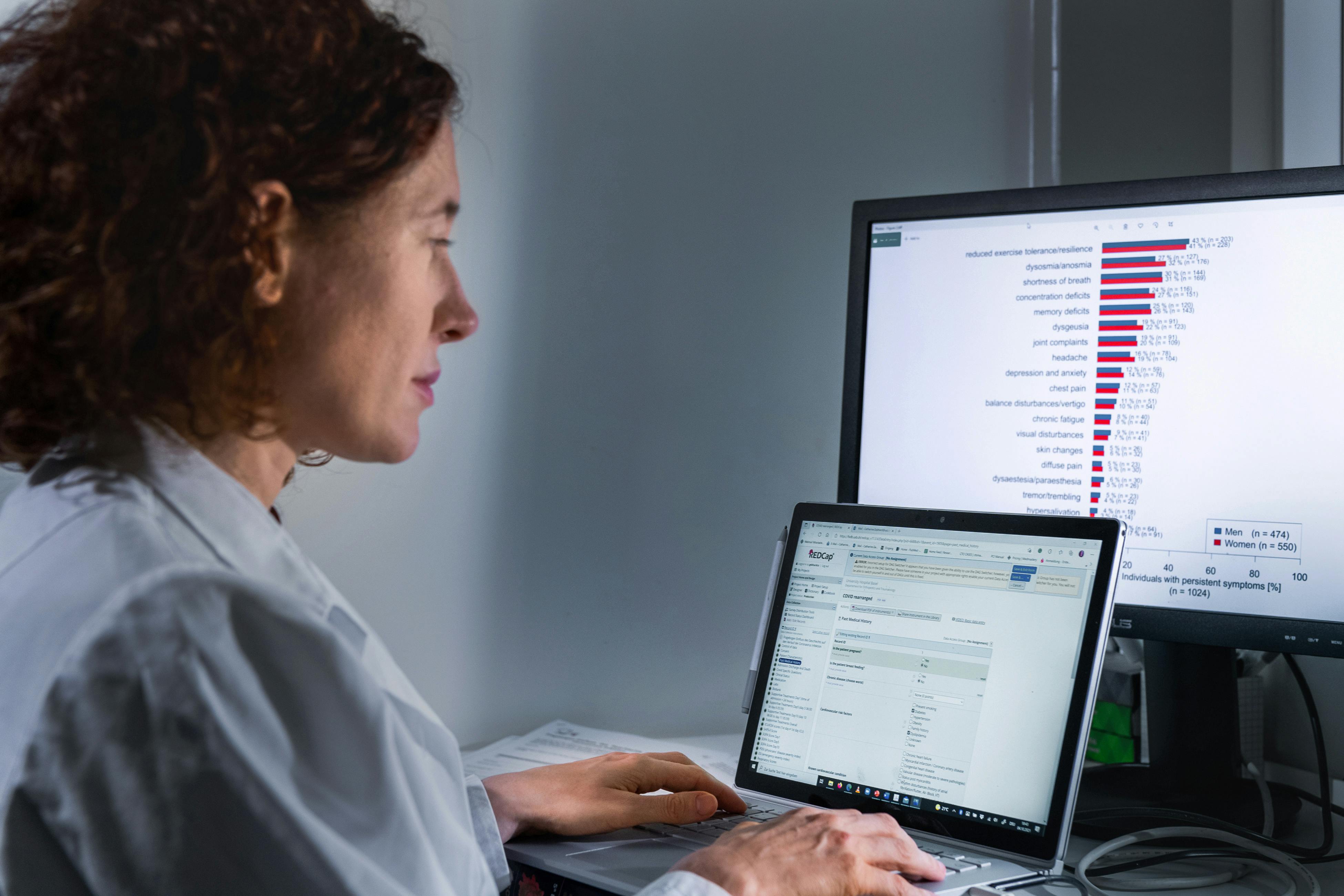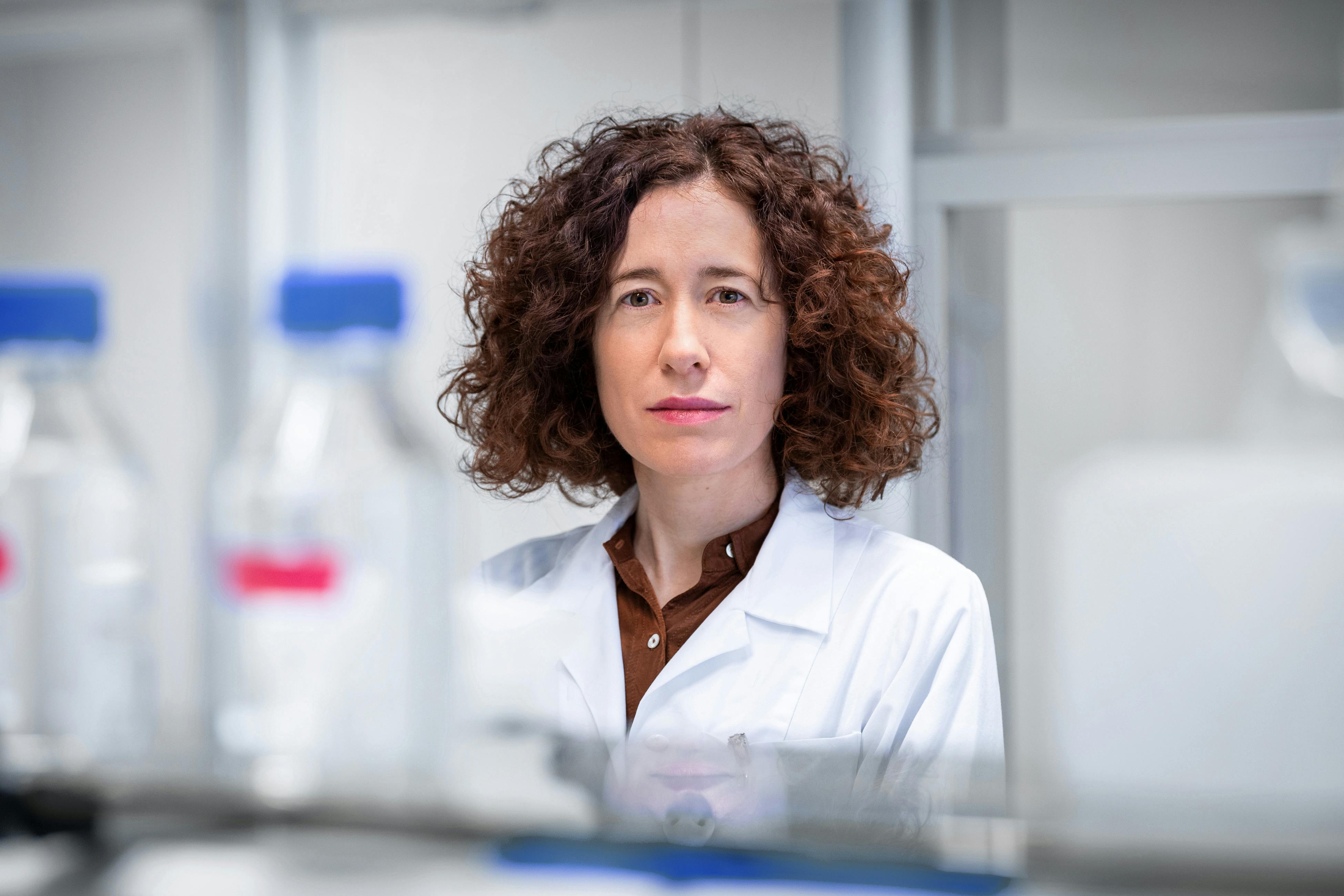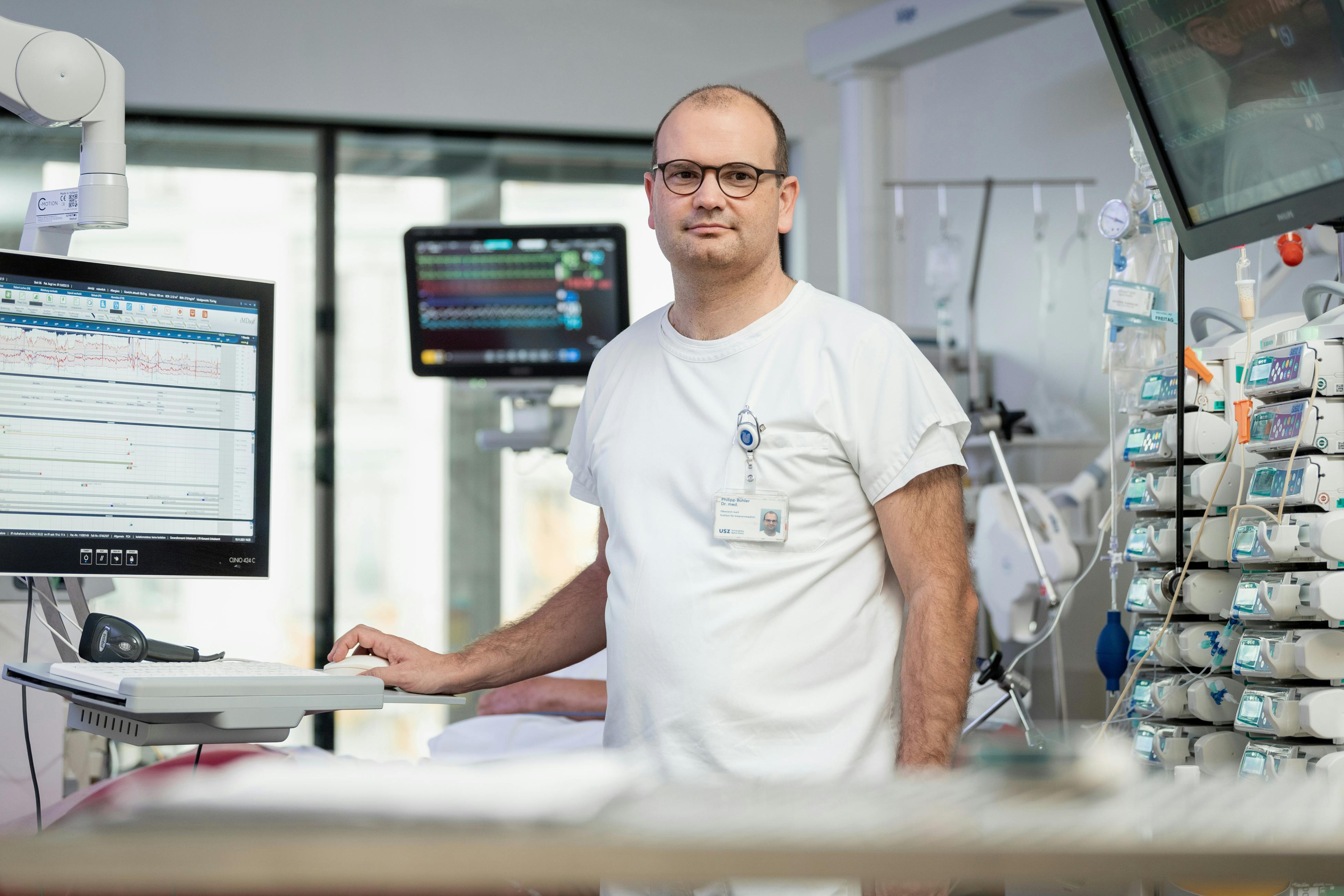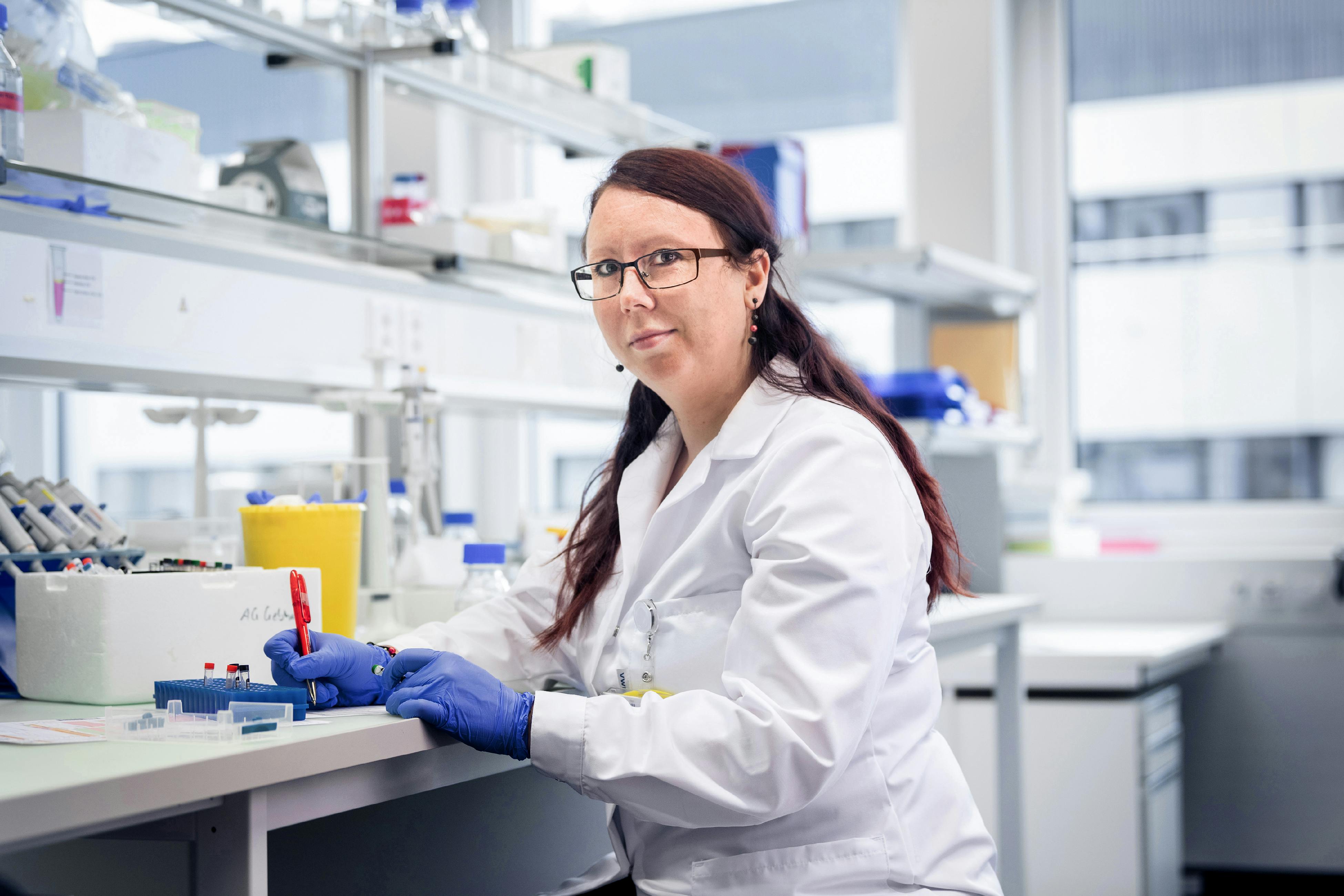
COVID-19:
Different disease progression
in women and men
Women are at greater risk of suffering from the symptoms of long COVID, while men are more likely to become acutely ill and will more often die from a COVID-19 infection. This was the finding reached by the research team headed by Professor Cathérine Gebhard MD after evaluating clinical patient data and survey responses from more than 6000 people who suffered from COVID-19 with varying degrees of severity.
Contact
Professor Cathérine Gebhard MD
Attending physician in the Department
of Nuclear Medicine and SNSF Professor of
Cardiovascular Gender Medicine and
Cardiac Imaging at the University of Zurich
+41 44 255 29 28
E-Mail
UMZH institutions
University of Zurich
ETH Zurich
University Hospital Zurich
Team
>
Tragic moments and rays of hope in the ICU
«We have seen many heartbreaking cases. A number of patients spent several months in intensive care.» Dr. Philipp Bühler, ICU physician at University Hospital Zurich, also speaks for his colleagues in the medical and care teams when he says: «The tragic cases where we fought for a long time to save the lives of patients, ultimately without success, hit us very hard.» But during the course of the pandemic, there have also been rays of hope. Patients who spent a long time on a ventilator have recovered. The treatments available were continuously refined and improved and have had a positive impact.
The research into the disease, which began very early on, has also helped in this respect. As early as the spring of 2020, critical care doctors and infectiologists at the university hospital began building up a biodatabase of blood samples. They soon started working closely with the research group headed by the Swiss National Science Foundation (SNSF) professor Cathérine Gebhard from the University of Zurich. A specialist in gender medicine and cardiology, she is investigating the gender-specific differences in COVID-19 infections. The study has already produced initial results which indicate that to date, women have been at greater risk than men of suffering the long-term effects of COVID-19, i.e. symptoms of long COVID. The gender of the patient therefore has an influence on the development of the long-term consequences. On the other hand, men were more likely to become acutely ill and more frequently died from COVID-19 infections.
Data from more than 6000 patients
The team headed by SNSF Professor Cathérine Gebhard was able to make use of the biodatabase set up by the ICU physicians, who not only took regular blood samples from the patients, but also collected bodily secretions, for example from the lungs, during the patients’ stay in intensive care. The levels of sex and stress hormones in the blood were measured, among other things. Together with personal information about the people affected, such as details of pre-existing conditions, the analysis of the samples allowed a comprehensive picture to be built up. «We made use of synergies and all benefited from the different perspectives of the various disciplines,» explains intensive care physician Philipp Bühler.
As well as gathering patients’ clinical data, the research group headed by the gender medicine specialist Cathérine Gebhard carried out a survey of almost 6000 people who had fallen ill with COVID-19 to varying degrees. Between six and nine months after the acute infection, they answered around 70 questions, including some about the long-term consequences. The questions also covered sociocultural factors, such as the need to carry out household tasks and the resulting stress, which are areas that tend to affect men and women differently.

Gender has an influence on the development of long-term consequences. Cathérine Gebhard's team examines blood samples and measures sex and stress hormones, among other things.
Increased risk of long COVID among women
«Typical female roles involve more domestic work and childcare and this apparently presents a risk of developing long COVID symptoms,» says Cathérine Gebhard, summing up the results. «The finding of our study that surprised me most was that pregnancy and care-related tasks that are perceived positively were more likely to provide protection against long COVID.» How can this knowledge be used in a clinical context? Gebhard and Bühler hope that it will primarily have a preventive effect. The ICU physician explains that, because the risk factors are now known, this will allow patients who are particularly at risk to be identified quickly. «For example, it would be possible to increase the number of diagnostic tests for these patients and monitor them more closely at an early stage.»
The role of nuclear medicine
Several centers are involved in the study including the University of Zurich, University Hospital Zurich, and the university hospitals in Bern and Basel. In addition, a research group from the Institute of Pharmaceutical Sciences at ETH Zurich and the Paul Scherrer Institute is also taking part under the leadership of Professor Roger Schibli. His team specializes in nuclear medicine and develops radioactive substances for diagnosing diseases. For example, radioactive materials used in imaging processes can make tumors visible.
This technology will also be used in the future to identify COVID-19 patients who are at particular risk and to monitor the progression of the disease. The researchers aim to use radioactive substances to mark the receptors in cells that the coronavirus binds to so that it can penetrate the cells. The results could then be investigated to identify gender differences. The researchers are currently evaluating the basic principles, including with experiments on mice. Schibli says: «No other groups in Switzerland have the same expertise in this area or the same infrastructure as we do.»
Biological or sociocultural factors?
Recent studies explored whether gender – thus not the biological sex but sociocultural factors (e.g. the roles and behaviour of men and women) – has an influence on the severity of an acute COVID-19 infection. In a study published in August 2022, a group of scientists headed by Cathérine Gebhard compared the influence of biological factors with sociocultural differences between men and women. They found out: the reasons for a more severe acute infection in men are mostly based on biology rather than sociocultural factors (gender). These include sex differences in cardiovascular risk factors and immune responses.
Sociocultural factors instead play a minor role in the severity of an acute COVID-19 infection. Only parameters such as a strong personality or a lower level of education can lead to a higher risk of a severe course.
Study about risk-factors for Long COVID
Study about the influence of gender on an acute COVID-19 illness
Review on the gender differences in COVID-19 illness
Listen
Cathérine Gebhard (Audio file in German)
«An interdisciplinary study team is highly important»
Professor Cathérine Gebhard MD is attending physician in the Department of Nuclear Medicine and SNSF Professor of Cardiovascular Gender Medicine and Cardiac Imaging at the University of Zurich.

Karl Philipp Bühler (Audio file in German)
«Stress factors in everyday life increase the risk of long COVID among women»
Dr. Karl Philipp Bühler is attending physician and deputy head of the intensive care unit at University Hospital Zurich.

Roger Schibli (Audio file in German)
«If we can identify the entry route of the virus, we can develop customized medicines»
Professor Roger Schibli is a professor at the Institute of Pharmaceutical Sciences at ETH Zurich.

Service
Long COVID clinic at University Hospital Zurich
Coronavirus center of the University of Zurich
Coronavirus testing at University Hospital Zurich
Coronavirus vaccination at University Hospital Zurich


Glossary
COVID-19 and SARS-CoV-2:
The coronaviruses are a family of viruses that can cause various diseases. Seven different coronaviruses have so far been identified in humans. The current coronavirus is officially known as SARS-CoV-2. The illness caused by a SARS-CoV-2 infection is called COVID-19.
Long COVID:
Some patients only recover very slowly from a COVID-19 infection and experience long-lasting symptoms such as breathing difficulties, coughing, chest pain, and fatigue even after the acute phase of the disease is over. Taken together, these symptoms are known as long COVID. Women are more likely to be affected.
Nuclear medicine:
This involves the development of radioactive substances for the purpose of diagnosing diseases. For example, radioactive materials used in imaging processes can make tumors visible.
Biobank:
A collection of substances, such as bodily fluids and tissue samples, with associated data that are managed in databases.
Gender medicine:
Biological and sociocultural gender has an impact on the presentation, progression, treatment, and diagnosis of diseases. However, gender-specific differences are often ignored in the medical world. This is where gender medicine – a form of medicine that takes into account precisely these differences – comes into play. In one of the first initiatives of its kind in Switzerland, the Faculty of Medicine of the University of Zurich has committed to incorporating gender-specific medicine into research, clinical practice, and teaching.
Who is co-financing this project? (in CHF millions)
The LOOP Zurich - Medical Research Center
The project funding lasts from 2020 to 2022
Credits
Text and audio: Rebekka Haefeli
Pictures: Frank Brüderli
University of Zurich: Cathérine Gebhard
University Hospital Zurich: Karl Philipp Bühler, Cathérine Gebhard
ETH Zurich: Roger Schibli
The LOOP Zurich - Medical Research Center: Jens Selige





